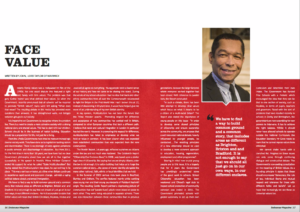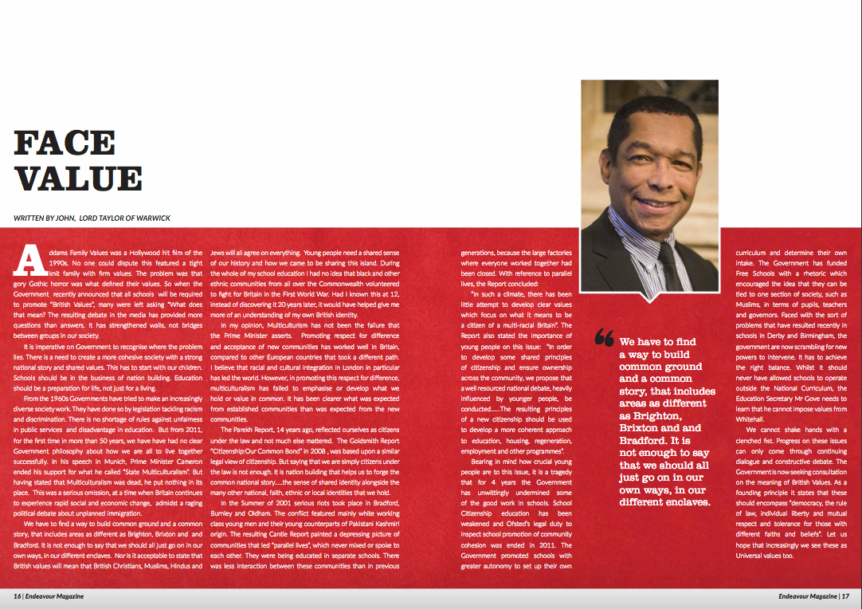
“Face Value,” written by Lord John Taylor of Warwick.
Addams Family Values was a Hollywood hit film of the 1990s. No one could dispute this featured a tight knit family with firm values. The problem was that gory Gothic horror was what defined their values. So when the Government recently announced that all schools will be required to promote “British Values”, many were left asking “What does that mean? The resulting debate in the media has provided more questions than answers. It has strengthened walls, not bridges between groups in our society.
It is imperative on Government to recognise where the problem lies. There is a need to create a more cohesive society with a strong national story and shared values. This has to start with our children. Schools should be in the business of nation building. Education should be a preparation for life, not just for a living.
From the 1960s Governments have tried to make an increasingly diverse society work. They have done so by legislation tackling racism and discrimination. There is no shortage of rules against unfairness in public services and disadvantage in education. But from 2011, for the first time in more than 50 years, we have had no clear Government philosophy about how we are all to live together successfully. In his speech in Munich, Prime Minister Cameron ended his support for what he called “State Multiculturalism”. But having stated that Multiculturalism was dead, he put nothing in its place. This was a serious omission, at a time when Britain continues to experience rapid social and economic change, amidst a raging political debate about unplanned immigration.
We have to find a way to build common ground and a common story, that includes areas as different as Brighton, Brixton and Bradford. It is not enough to say that we should all just go on in our own ways, in our different enclaves. Nor is it acceptable to state that British values will mean that British Christians, Muslims, Hindus and Jews will all agree on everything. Young people need a shared sense of our history and how we came to be sharing this island. During the whole of my school education I had no idea that black and other ethnic communities from all over the Commonwealth volunteered to fight for Britain in the First World War. Had I known this at 12, instead of discovering it 20 years later, it would have helped give me more of an understanding of my own British identity.
In my opinion, Multiculturalism has not been the failure that the Prime Minister asserts. Promoting respect for difference and acceptance of new communities has worked well in Britain, compared to other European countries that took a different path. I believe that racial and cultural integration in London, in particular, has led the world. However, in promoting this respect for difference, multiculturalism has failed to emphasise or develop what we hold or value in common. It has been clearer what was expected from established communities than was expected from the new communities.
The Parekh Report, 14 years ago, reflected ourselves as citizens under the law and not much else mattered. The Goldsmith Report “Citizenship: Our Common Bond” in 2008, was based upon a similar legal view of citizenship. But saying that we are simply citizens under the law is not enough. It is nation building that helps us to forge the common national story…. The sense of shared identity alongside the many other national, faith, ethnic or local identities that we hold.
In the Summer of 2001 serious riots took place in Bradford, Burnley, and Oldham. The conflict featured mainly white working class young men and their young counterparts of Pakistani Kashmiri origin. The resulting Cantle Report painted a depressing picture of communities that led “parallel lives”, which never mixed or spoke to each other. They were being educated in separate schools. There was less interaction between these communities than in previous generations, because the large factories where everyone worked together had been closed. With reference to parallel lives, the Report concluded:
“In such a climate, there has been little attempt to develop clear values which focus on what it means to be a citizen of a multiracial Britain”. The Report also stated the importance of young people on this issue: “In order to develop some shared principles of citizenship and ensure ownership across the community, we propose that a well-resourced national debate, heavily influenced by younger people, be conducted……The resulting principles of a new citizenship should be used to develop a more coherent approach to education, housing, regeneration, employment and other programmes”.
Bearing in mind how crucial young people are to this issue, it is a tragedy that for 4 years the Government has unwittingly undermined some of the good work in schools. School Citizenship education has been weakened and Ofsted’s legal duty to inspect school promotion of community cohesion was ended in 2011. The Government promoted schools with greater autonomy to set up their own curriculum and determine their own intake. The Government has funded Free Schools with a rhetoric which encouraged the idea that they can be tied to one section of society, such as Muslims, in terms of pupils, teachers and governors. Faced with the sort of problems that have resulted recently in schools in Derby and Birmingham, the government are now scrambling for new powers to intervene. It has to achieve the right balance. Whilst it should never have allowed schools to operate outside the National Curriculum, the Education Secretary Mr. Gove needs to learn that he cannot impose values from Whitehall.
We cannot shake hands with a clenched fist. Progress on these issues can only come through continuing dialogue and constructive debate. The Government is now seeking consultation on the meaning of British Values. As a founding principle it states that these should encompass “democracy, the rule of law, individual liberty and mutual respect and tolerance for those with different faiths and beliefs”. Let us hope that increasingly we see these as Universal values too.
To view, “Face Value” in Endeavour Magazine click here.
